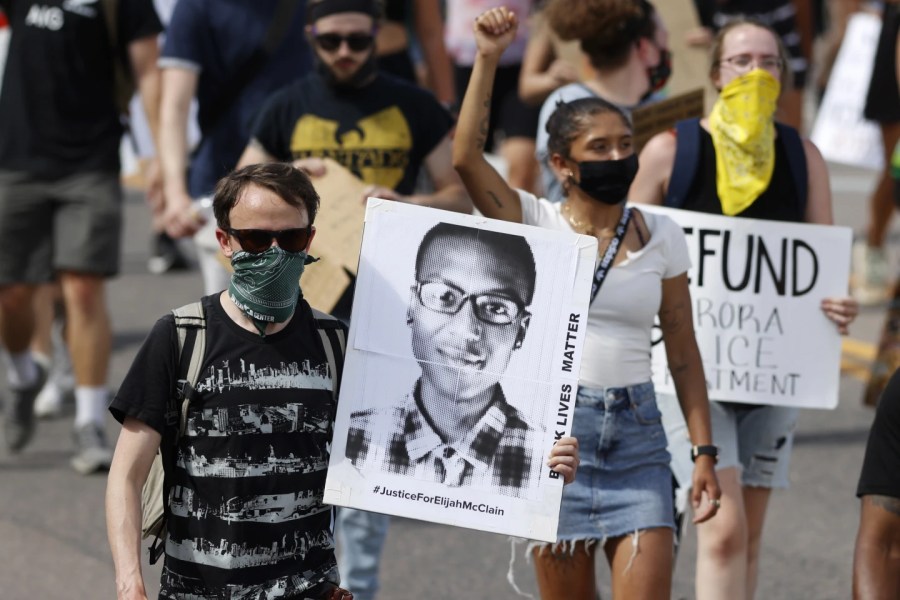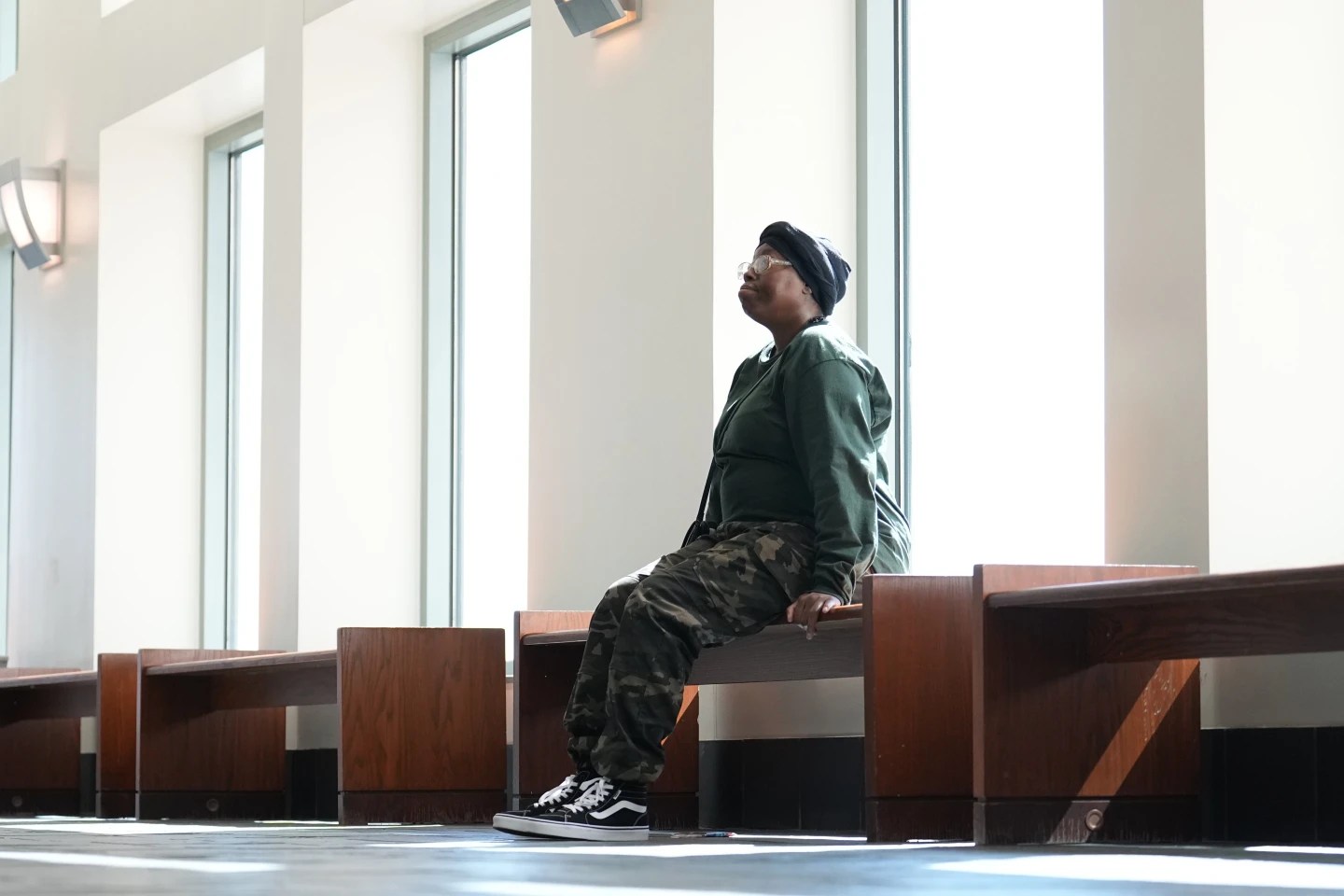What to know about Elijah McClain’s death and the cases against police and paramedics
A second trial began Friday in the cases surrounding the 2019 homicide of McClain
DENVER (AP) — Jurors delivered a split verdict against two officers charged in the 2019 death of Elijah McClain during the first of several trials over the Black man’s fatal confrontation with police while walking home in suburban Denver, convicting one and clearing the other.
A second trial began Friday with jury selection in the case of Aurora Officer Nathan Woodyard, who helped restrain McClain and put him in the neckhold that rendered him temporarily unconscious.
Paramedics later injected the 23-year-old massage therapist with an overdose of a powerful sedative, ketamine. He was pronounced dead three days later. Paramedics Jeremy Cooper and Lt. Peter Cichuniec are scheduled to stand trial next month.

Judge Mark Warner ruled in January that there would be separate trials to ensure they would be fair. McClain’s death was one of several that were revisited after the May 2020 police killing of George Floyd, and his name became a rallying cry at the ensuing social justice protests.
Here’s what you need to know about McClain’s death:
WHY WAS ONLY ONE OFFICER CONVICTED IN THE FIRST TRIAL?
The jury convicted Aurora Officer Randy Roedema of criminally negligent homicide and third-degree assault but acquitted Officer Jason Rosenblatt on all counts.
The officers had faced similar charges and the jury didn’t explain its decisions. During the trial, Rosenblatt’s attorneys pointed out that he wasn’t near McClain when he was injected with ketamine.
Prosecutors alleged that Rosenblatt held McClain’s legs when he was on the ground before Rosenblatt stepped away, while Roedema held McClain’s shoulder and back. Roedema and another officer who wasn’t charged restrained McClain while paramedics administered the ketamine.
Roedema was the senior of the two officers. He was often visible in the body camera footage shown to jurors. At times, he seemed to be directing others what to do.
Rosenblatt had only been on the force for two years when McClain died. He was fired in 2020 for making light of a reenactment by other officers of the neckhold.
Former Colorado prosecutor George Brauchler said the jury seemed to be thoughtful in that it distinguished between the two officers’ actions and rejected prosecutors’ suggestion that there had been some complicity between them.
Braucher, who prosecuted the 2012 Colorado theater shooting. said it appears the jury found there was enough medical evidence to hold Roedema accountable for McClain’s death because of the distress he was in before he was injected with ketamine. In holding Roedema accountable, though, they convicted him of the least serious charges they were presented with, he said.
Roedema could get anywhere from probation to three years in prison when he’s sentenced Jan. 5.
WHY DID POLICE STOP McCLAIN?
A 911 caller reported that McClain, who was wearing earbuds and listening to music, seemed “sketchy” and was waving his arms as he walked home from a convenience store in Aurora on the night of Aug. 24, 2019. McClain was often cold and wore a runner’s mask and jacket despite the warm weather, prosecutors said in the indictment.

Jurors were shown surveillance video from the store of McClain wearing the mask and waiting to pay for three cans of ice tea. No one else in the store appeared concerned that he was in a mask, although the clerk’s back was to the camera.
Three officers approached McClain after he left the store. Within 10 seconds, Officer Nathan Woodyard put his hands on McClain and turned him around. As McClain tried to escape his grip, Woodyard said, “Relax, or I’m going to have to change this situation.”
The encounter quickly escalated, with officers taking McClain to the ground and putting him in a neckhold, pressing against his carotid artery. Paramedics arrived and injected McClain with ketamine. He went into cardiac arrest on the way to the hospital and was taken off life support three days later.
There seems to be a shift in the willingness of juries to hold police officers accountable for misconduct in recent years, said Tracie Keesee, who co-founded the Center for Policing Equity, which focuses on improving public safety systems for vulnerable communities. However, there also needs to be changes made to how police respond to things such as traffic and pedestrian stops to try to avoid tragedies like McClain’s death, she said.
“We shouldn’t even be here and the young man should be alive,” she said.
DID THE KETAMINE OR NECKHOLD KILL McCLAIN?
The neckhold, called a carotid control hold, restricts the flow of blood to a person’s brain, rendering them temporarily unconscious. Many states, including Colorado, have passed limits on neck restraints since the murder of Floyd in Minneapolis.
McClain had been kept on the ground for 15 minutes when paramedics gave him 500 milligrams of ketamine. He weighed 140 pounds (64 kilograms) but received a higher dose of ketamine than recommended for someone of his size, said Dr. Stephen Cina, a forensic pathologist who peformed McClain’s autopsy. Cina ultimately decided that McClain died of complications from the ketamine, noting that it occurred after the forcible restraint. However, he wasn’t able to say if the death was a homicide or an accident, or whether the officers’ actions contributed to it.
Pulmonologist David Beuther testified for the prosecution that McClain threw up repeatedly and inhaled vomit, which made it hard to breathe. Even before the ketamine was injected, McClain’s health had deteriorated to the extent that he belonged in an intensive care unit, he said.
WHY WERE THE OFFICERS CHARGED?
A prosecutor initially decided not to bring charges in McClain’s death largely because the initial autopsy didn’t determine exactly how he died.
Following the protests over Floyd’s death, though, Democratic Gov. Jared Polis directed the state attorney general to re-investigate the McClain case. A grand jury indicted the three officers and two paramedics in 2021. Cina said he changed his autopsy findings to pin the blame on ketamine in 2021 after looking at body camera footage.
TheGrio is FREE on your TV via Apple TV, Amazon Fire, Roku and Android TV. Also, please download theGrio mobile apps today!


